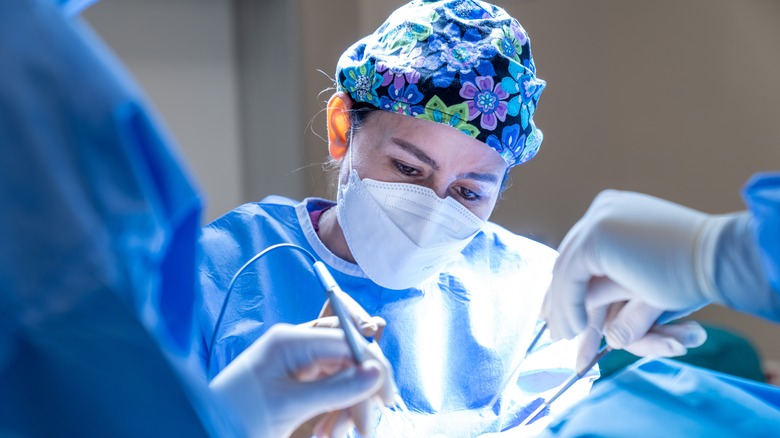Can New Chemotherapy Methods Reduce The Need For Breast Cancer Surgery?
We all know someone who has cancer or has dealt with cancer. As there's no cure for the disease yet, every time a new finding or advancement in treatment develops, it's a reason for celebration. A recent study regarding breast cancer surgery could be the cause for some excitement.
Breast cancer is responsible for 12.5% of new cancer cases yearly and is the most common cancer worldwide (per Breastcancer.org). Breast cancer occurs when breast cells grow rapidly and abnormally and eventually create a mass or lump (via Mayo Clinic). A mammogram, ultrasound, physical exam, biopsy, MRI, or a combination of these tests will be performed to diagnose breast cancer. Once it's confirmed, various treatment options may be used or combined to attempt to treat the disease.
Treatment can consist of radiation therapy, hormone therapy, immunotherapy, chemotherapy, and various surgeries involving removing lymph nodes, tumors, or the affected breast itself. These therapies take their toll, but can effectively reduce or remove cancer. Unfortunately, most women undergo surgery as their primary treatment for breast cancer, sometimes using other treatment options in conjunction with surgery. According to Cancer Treatment Centers of America, neoadjuvant therapies are those administered before the primary treatment, including options like chemotherapy or hormone therapy, and can reduce the tumor size or kill cancer cells. Advancements in these treatments are really demonstrating their importance now. A new study published in The Lancet has revealed some significant findings regarding the effectiveness of neoadjuvant therapies on some cancers.
Neoadjuvant therapies can help avoid surgery
There are two types of breast cancer that respond very well to neoadjuvant therapies: triple-negative and HER2-positive breast cancers. Johns Hopkins Medicine reports that triple-negative breast cancer makes up 10%–20% of all breast cancer. While chemotherapy is commonly used as part of treatment, surgery is also an important aspect of it. Similarly, 15%–20% of breast tumors contain hormone epidermal growth factor receptor 2 (HER2) proteins and are considered HER2-positive breast cancer (per American Cancer Society).
In the just-released study, 50 women with either triple-negative or HER2-positive breast cancer were tested via biopsy after undergoing standard neoadjuvant systemic therapy (NST) regimens. 31 of the 50 women had a pathological complete response, meaning their breast cancer was eliminated. When tested again more than 26 months later, there were no tumor recurrences in any of the 31 women. Surgery was not required for those 31 women, and their cancer was cured due to first receiving NST treatment.
Regarding the positive results of the study, Dr. Henry M. Kuerer, lead author of the study and executive director of breast programs at MD Anderson Center at the University of Texas told Medical News Today, "It is clear that targeted systemic therapies are greatly improving, from about a 12% pathologic complete response 20 years ago to 70% in triple-negative breast cancer today." Although the test results don't point to a perfect treatment, replicating this study's success could help eliminate surgery for many of those with breast cancer.


